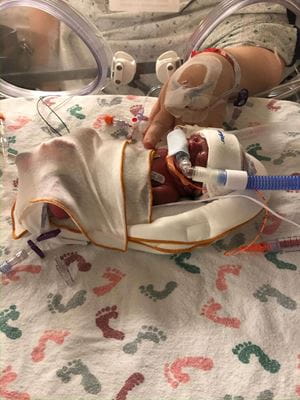Leiana Rodgers: Extreme Prematurity and Complications
She wasn’t due until Thanksgiving Day 2020. But Leiana Rodgers had other things in mind, making her dramatic entrance into the world at just 24 weeks and five days, weighing only 1.5 pounds. When serious complications developed, she was transferred to UPMC Children’s Hospital of Pittsburgh for life-saving surgery.
The Challenge: Necrotizing Enterocolitis (NEC)
Katie and Marvin Rodgers became parents in August 2020 when Leiana was delivered 14 weeks early by emergency Cesarean section at UPMC Magee-Womens Hospital.
“The first two weeks after Leiana was born were smooth, then things got rocky,” says Katie. “She really kept us on our toes.”
Many complications can develop in the first weeks of a premature baby’s life — especially those born extremely premature before 26 weeks of pregnancy. Like many preemies, Leiana developed brain bleeds, severe jaundice, and needed respiratory care and multiple blood transfusions. But her most serious complication was necrotizing enterocolitis (NEC), a condition in which the intestine becomes inflamed or injured.
The Path to UPMC Children’s Hospital of Pittsburgh
Leiana was initially treated for NEC with antibiotics at UPMC Magee’s neonatal intensive care unit (NICU). But when the 6-week-old developed NEC again, her doctors suspected she needed  surgery. She was transferred to the NICU at UPMC Children’s.
surgery. She was transferred to the NICU at UPMC Children’s.
“They told us Leiana needed surgery to remove the damaged part of her intestine,” says Katie, a White Oak resident and behavioral health coach with UPMC Health Plan. “NEC is common in premature babies, but it’s very serious.”
Katie and Marvin felt confident their newborn was in good hands with the neonatology team at Children’s.
“They provide great care. We are very lucky to have Children’s Hospital in our backyard,” says Katie.
The Solution: Surgery to Removed Damaged Bowel
Any newborn can develop NEC, but it is most common in very sick or premature babies. The smaller and earlier the baby, the higher the risk because NEC is a serious condition that might cause the baby’s bowel tissue to become injured or even die (become necrotic). Bacteria from the dead tissue can cause infection and more damage in other parts of the body.
When Leiana was 2 months old, surgeons at Children’s removed a small, damaged part of her intestine. They also performed a colostomy to allow her bowel to heal by rerouting the stool.
Leiana needed a breathing tube for several weeks after surgery. She was then placed on a CPAP (continuous positive airway pressure) machine and moved from an incubator to a crib the same day.
“That was big step for her development,” says Katie. “That’s when she started physical therapy, occupational therapy, and tummy time. We would put her on her tummy for short periods of time, which is really important to developing her trunk and neck muscles.”
Over the next two months, her care team tried “room air trials” until she was off the CPAP completely. At age 5 months, Leiana had her first bottle.
“That was such a big deal,” says Katie. “It was another big — and emotional — step for Leiana and for us.”
Another Surgery: Preparing for Home
In early March 2021, Leiana had surgery to remove the colostomy and reconnect her bowel. Because she was still struggling to eat, a feeding tube was inserted through her belly to deliver nutrients directly to her stomach. Although she again had to have a breathing tube inserted, it was removed just a week later.
Three weeks later at the age of 7 1/2 months, Leiana finally headed home after a combined 232 days in the NICU. The NICU staff celebrated with a graduation ceremony, lining the hallway as she left the unit wearing a graduation cap with the traditional “Pomp and Circumstance” march playing.
“In my heart, I always knew she was going home with us,” says Katie. “Her birth was one of the best days of my life, but also the scariest. That day she finally came home was truly the best day of my life.”
The Results: Growing and Thriving
In the 18 months since she went home, Leiana has continued to grow and thrive. While doctors were concerned the brain bleeds might affect her development, Leiana began talking at age 18 months and walking two months later.
Now a petite 2-year-old, Leiana no longer needs physical therapy. But she continues to work with occupational and nutrition therapists to improve her eating.
“She’s walking, talking, and loves to climb. She’s very active and always on the go,” says Katie.
“Leiana has been feisty since day 1. She’s very determined and always wants to try to do things without help.
“We are so grateful for the care that Leiana received at Children’s and believe if she had been anywhere else, she may not be here today,” she adds. “Leiana literally received life-saving care at Children’s and we could never thank them enough for giving our girl her best chance at life.”
Leiana’s treatment and results may not be representative of all similar cases.









